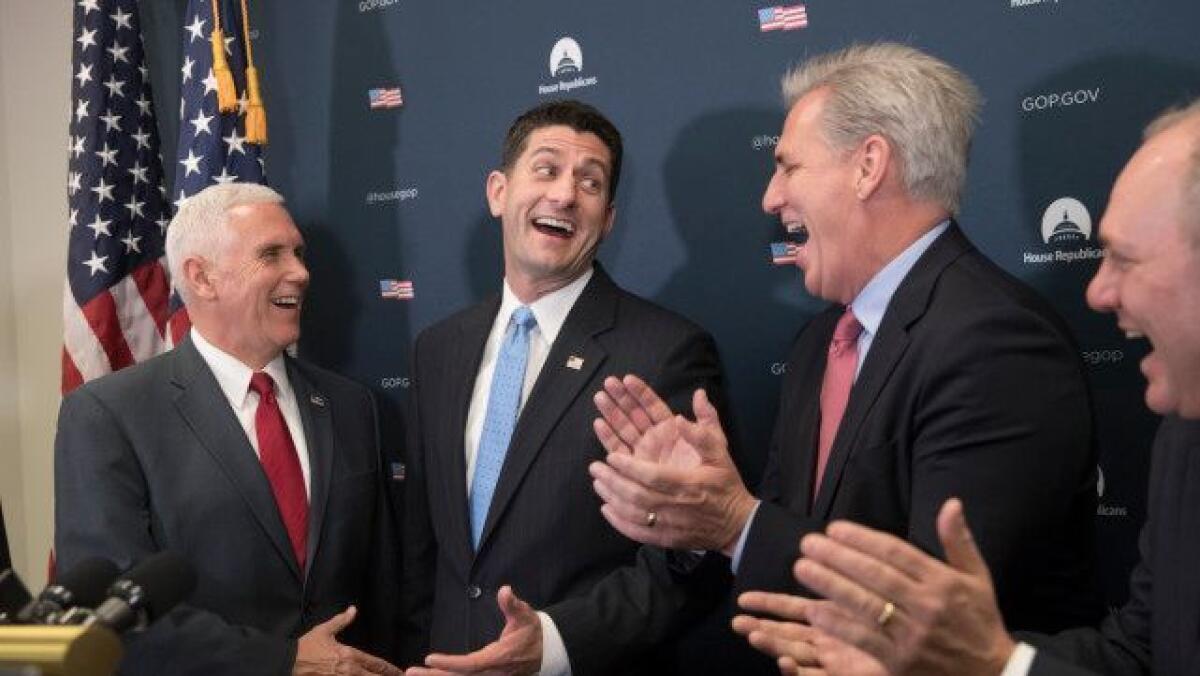Column: Repealing Obamacare could be a matter of life or death for many Americans. Here are their voices

Not a laughing matter for ACA customers: VP-elect Mike Pence, left, shares a joke with (from second from left) House Speaker Paul Ryan of Wis., House Majority Leader Kevin McCarthy of Calif., and House Majority Whip Steve Scalise of Louisiana.
For Julie Ross, the looming repeal of the Affordable Care Act isn’t an abstract political issue. It’s a life-or-death matter for her 4 1/2-year-old daughter, who was born with Down syndrome and a congenital heart condition and spent her first month in the neonatal intensive care unit.
In the pre-Affordable Care Act era, when insurers could impose lifetime limits on benefits, hers was $500,000. “She would have reached that in her first two weeks,” Ross says.
For Colleen Mondor, whose 15-year-old son was diagnosed with Type 1 diabetes at age 3 and controls it today with four visits a year to a pediatric endocrinologist, repeal would mean shutting down the aircraft leasing company that she and her husband started and finding a job with employer-paid insurance. “So instead of building our own company, we’ll be taking jobs away from people who need them.”
Senators say, without health insurance you can just go to the ER for care. For my daughter, that would be too late. She’ll die without these protections.
— Julie Ross of Dallas
Pre-Obamacare, every insurer she applied to for coverage asked about her family’s medical histories. When she told them about her son’s diabetes, as she tweeted earlier this month: “That was the end of the conversation, every. single. time.”
Steve Waxman, 59, an independent filmmaker in Miami, had a heart attack before Obamacare was enacted, but he had insurance. If the Affordable Care Act is repealed and protections for those with preexisting conditions are eroded, he’d be red-tagged as a potentially costly repeat patient. “Life is a preexisting medical condition,” he observes. “Only in America can you go bankrupt because of it.”
David Zasloff, 55, of North Hollywood is still recovering from a stroke he suffered in 2015. Without the Affordable Care Act, treatment “would have cost everything I had, including my niece’s college fund,” he says. Now he has a Blue Shield silver plan via Covered California, the state’s Obamacare exchange, and pays $144 a month to cover most of his treatment and medication.
Ross, Mondor, Waxman and Zasloff, and countless more like them, live in abject fear that Republicans will follow through on their determination to repeal the Affordable Care Act, without passing a replacement that will maintain the crucial protections the law has given them. Obamacare’s critics have painted a picture of the law that is wholly negative: that it’s a “disaster,” that it’s in a “death spiral,” that it’s caused a “struggle” for families that use it. To people not directly affected by the Affordable Care Act — the 85% of Americans who get their coverage from their employers or public programs such as Medicare — these assertions seem plausible enough, especially since they’ve been repeated incessantly for more than six years. Repeat a big lie often and loudly enough, and you don’t need evidence.
House Speaker Paul Ryan (R-Wis.) often repeats a mantra that “Obamacare has failed the American people.” But a Ways and Means Committee fact sheet he cites as evidence doesn’t include a single quote from an Obamacare enrollee. Not one.
The people who know the truth — those whose medical histories would make them uninsurable in a non-Obamacare marketplace, who would face bankruptcy if they faced a major medical need, whose condition would go unmanaged, or who would be forced to give up their dream of creating their own business and working for themselves — their voices are seldom heard. So we’re going to present a few.
Some are insurance customers who struggled with coverage — not from Obamacare, but in a pre-Affordable Care Act market in which carriers looked for any reason to reject applicants, limit their benefits or impose costly surcharges. They struggled with high deductibles, with high-risk pools such as those that Ryan says could easily accommodate Americans with chronic conditions. They know he’s wrong. Some took advantage of the freedom the Affordable Care Act brought them to start their own businesses, because now they could give up their employer-paid insurance without fear of going without coverage. And they know the frustration that comes from going unheard on Capitol Hill.
Julie Ross, 41, runs a home business in the Dallas area with her husband Mark, a commercial artist. She home-schools her daughters, 4 1/2-year-old Niko and her 7-year-old sister. Julie suffers from asthma, a condition that relegated her to a high-risk pool before the Affordable Care Act. Before Niko was born, she told me, she and her husband kept separate health plans, so that her own condition wouldn’t affect the cost of his coverage.
Niko’s conditions require constant pro-active management. “I hear senators say, without health insurance you can just go to the ER and get care,” she says. “For my daughter, that would be too late. She’ll die without these protections.”
Ross has reached out to Texas Sens. Ted Cruz and John Cornyn, both Republicans, and her congressman, Rep. Pete Sessions (R-Dallas). The offices of Sessions and Cruz won’t return her calls. Cornyn’s staff met with her, but parroted his idea of giving families such as hers a tax credit to buy insurance, but it wouldn’t be enough.
“When I talk to Republicans, I tell them we’re everything you want us to be,” she says. “We’re self-employed, we’re pro-life.” But if she lost the access to coverage she gets from the Affordable Care Act, to replace it for her daughter, “I would have to get a divorce from my husband and move into Section 8 housing and go onto Medicaid and welfare. We are living in total fear.”
Colleen Mondor, a pilot and writer, is 48 and runs an aircraft leasing firm in Alaska and the Pacific Northwest with her husband, Ward Rosadiuk, 53. The family’s healthcare nightmare started 12 years ago when their toddler came down with a cold and didn’t get better. He was diagnosed with Type 1 diabetes.
“That changed everything,” Mondor recalls. The family got shunted into a high-risk pool, where the deductible was $10,000 per person and the coverage was sharply constrained. “The high-risk pool is a party no one wants to attend,” she says. “It was absolute misery. We had no control over which doctors we could see, and the deductible was ridiculous.”
Frustrated about a debate about Obamacare that seemed utterly irrelevant to her situation, a few days after New Year’s, Mondor posted a tweet about the difficulties facing small business owners post-repeal. What followed was a torrent of retweets and replies. “I thought I was alone, but I discovered it was not just me,” she says.
Mondor’s teenage son has received first-rate care for his incurable disease thanks to the family’s Affordable Care Act-protected health plan. But pondering the GOP proposals to repeal the law has become a dominating distraction. “I’m not thinking about how to grow my business or get new clients,” she told me, “but about what [Vice President-elect] Mike Pence or Paul Ryan are up to.”
Affordable Care Act plans aren’t perfect. They’re often more expensive and less generous than the health plans offered by big employers. But for people without access to such plans, they’re a lifeline. People such as Donald Goudie of Irvine, 68, who was forced into retirement ahead of schedule when his department at IBM was downsized in 2014. IBM gave him six more months of company insurance, but after that, his wife, Sandra, needed coverage for her chronic rheumatoid arthritis.
The Goudies knew from having tested the pre-Obamacare individual market a few years ago that Sandra, now 63, would be uninsurable without the law’s protection for preexisting conditions. So would Donald, who has a cardiac condition. Because of the combination of a premium increase and a reduction of their eligibility for Affordable Care Act subsides, Sandra’s premium will rise to more than $500 a month this year from about $150 last year. “That’s a big jump, but still affordable,” he says. But that’s only if Congressional Republicans don’t tamper with Social Security and Medicare, on which the couple depends and which also are in the GOP’s crosshairs.
“We’ve gone from our retirement with enough money saved and supplemented with Social Security,” he says, “to wondering if we have enough money to pay for the basics.”
Do the Republicans who talk so blithely about how Obamacare has “failed the American people” and how they will provide “relief” — despite not having any “relief” plan in place despite six years of promising one — have any idea what their plans mean to millions of Americans facing the challenge of health coverage in their daily lives? The evidence is that they don’t, because they don’t talk to the targets of their plans.
Those whose lives hang in the balance of the debate over the Affordable Care Act are beginning to speak up. They’re independent business owners. Parents with desperately ill children. Adults with chronic diseases. Workers who have been laid off. Families for whom an uninsured injury or diagnosis would mean bankruptcy. The Affordable Care Act helps them, and could help even more if Republicans in Congress cared enough about them to make it better.
But to know that, they’d have to listen.
Keep up to date with Michael Hiltzik. Follow @hiltzikm on Twitter, see his Facebook page, or email [email protected].
Return to Michael Hiltzik’s blog.
More to Read
Inside the business of entertainment
The Wide Shot brings you news, analysis and insights on everything from streaming wars to production — and what it all means for the future.
You may occasionally receive promotional content from the Los Angeles Times.











